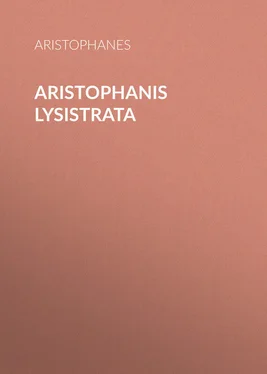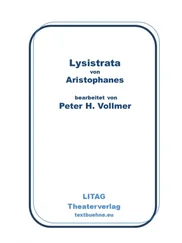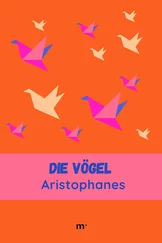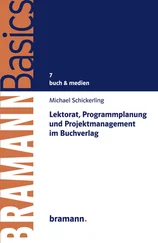Aristophanes - Aristophanis Lysistrata
Здесь есть возможность читать онлайн «Aristophanes - Aristophanis Lysistrata» — ознакомительный отрывок электронной книги совершенно бесплатно, а после прочтения отрывка купить полную версию. В некоторых случаях можно слушать аудио, скачать через торрент в формате fb2 и присутствует краткое содержание. Жанр: foreign_antique, foreign_prose, на латинском языке. Описание произведения, (предисловие) а так же отзывы посетителей доступны на портале библиотеки ЛибКат.
- Название:Aristophanis Lysistrata
- Автор:
- Жанр:
- Год:неизвестен
- ISBN:нет данных
- Рейтинг книги:3 / 5. Голосов: 1
-
Избранное:Добавить в избранное
- Отзывы:
-
Ваша оценка:
- 60
- 1
- 2
- 3
- 4
- 5
Aristophanis Lysistrata: краткое содержание, описание и аннотация
Предлагаем к чтению аннотацию, описание, краткое содержание или предисловие (зависит от того, что написал сам автор книги «Aristophanis Lysistrata»). Если вы не нашли необходимую информацию о книге — напишите в комментариях, мы постараемся отыскать её.
Aristophanis Lysistrata — читать онлайн ознакомительный отрывок
Ниже представлен текст книги, разбитый по страницам. Система сохранения места последней прочитанной страницы, позволяет с удобством читать онлайн бесплатно книгу «Aristophanis Lysistrata», без необходимости каждый раз заново искать на чём Вы остановились. Поставьте закладку, и сможете в любой момент перейти на страницу, на которой закончили чтение.
Интервал:
Закладка:
Aristophanes
Aristophanis Lysistrata
LYSISTRATA, CALONICE, MYRRHINA, LAMPITO
LYS. – At si quis in ædem Bacchi vocasset eas, aut Panos, aut Coliadis, aut Genetyllidis, 1 1 At Athens more than anywhere the festivals of Bacchus (Dionysus) were celebrated with the utmost pomp – and also with the utmost licence, not to say licentiousness.
ne transire quidem liceret præ multitudine tympanorum: nunc autem nulla adest hic mulier. Verumtamen hæc vicina mea foras exit. Salve, ô Calonice.
CAL. – Et tu mecastor salve, Lysistrata. Sed quid conturbata es? exporge frontem, carissima: non enim te decent contracta supercilia.
LYS. – Sed, ô Calonice, uritur mihi cor, et valde me piget sexus nostri, quoniam viri existimant 2 2 Leipzig: "existumant"
nos esse nequam.
CAL. – Quippe tales pol sumus.
LYS. – Quumque edictum illis fuerit huc convenire, deliberaturis de re non levi, dormiunt, nec veniunt.
CAL. – Sed, ô carissima, venient. Mulieribus domo prodire non ita facile est. Alia enim marito operam dat: alia famulum excitat: alia puerum in lecto collocat, alia lavat, alia cibo in os indito placat.
LYS. – Sed erant magis necessaria curanda ipsis.
CAL. – Quid autem est, mea Lysistrata, cur nos mulieres convocas? Quænam illa res est aut quanta?
LYS. – Magna. 3 3 An obscene double entendre ; Calonicé understands, or pretends to understand, Lysistrata as meaning a long and thick "membrum virile"!
CAL. – Num etiam crassa?
LYS. – Ita me servet Jupiter, crassa.
CAL. – Quî fit ergo, ut non veniamus?
LYS. – Nihil tale est: cito enim convenissemus. Sed est quiddam a me quæsitum, multis vigiliis in omnes partes versatum.
CAL. – Mirabor, ni subtile quid sit versatum istud in omnes partes.
LYS. – Adeo subtile, ut universæ Græciæ salus sita sit in mulieribus.
CAL. – In mulieribus? Parum ergo abest, quin nulla sit.
LYS. – Ita ut arbitri nostri sit, salvam esse rempublicam, aut nullos superesse, nec Peloponnesios —
CAL. – Nullos superesse edepol optimum 4 4 Leipzig: "optumum"
est.
LYS. – Bœotiosque omnes perire funditus.
CAL. – Non omnes, quæso; sed anguillas excipe. 5 5 The eels from Lake Copaïs in Boeotia were esteemed highly by epicures.
LYS. – De Athenis autem nil tale ominabor: tu ipsa conjecturam facias. 6 6 Leipzig: "De Athenis autem nil tale ominabor: aliud te suspicari velim.
Si vero convenerint huc mulieres ex Bœotia simul et Peloponneso, nosque Atticæ, communiter servabimus Græciam.
CAL. – Sed quid possent mulieres prudenter agere et præclare? nosne, quæ sedemus pigmentis nitentes, ornamentis excultæ, crocotas gestantes, et Cimbericas rectas, et peribaridas?
LYS. – Immo enimvero hæc ipsa sunt, a quibus salutem spero; crocotulæ, et unguenta, et peribarides, et anchusa, et pellucidæ tunicæ.
CAL. – Quo tandem modo?
LYS. – Ita ut illorum, qui nunc vivunt, virorum contra alium hastam nemo tollat.
CAL. – Crocotam ergo, ita me Ceres amet et Proserpina, mihi tingendam curabo.
LYS. – Nec clypeum sumat.
CAL. – Cimbericam induam.
LYS. – Nec gladiolum.
CAL. – Peribaridas emam.
LYS. – Annon ergo adesse mulieres oportebat?
CAL. – Quin pol volando venisse oportuit dudum.
LYS. – Sed, pro dolor! videbis eas esse nimis Atticas, dum omnia faciunt justo tardius. 7 7 This is the reproach Demosthenes constantly levelled against his Athenian fellow-countrymen – their failure to seize opportunity.
At nec ex maritimis ulla mulier adest, nec ex Salamine. 8 8 An island of the Saronic Gulf, lying between Magara and Attica. It was separated by a narrow strait – scene of the naval battle of Salamis, in which the Athenians defeated Xerxes – only from the Attic coast, and was subject to Athens.
CAL. – Sed has scio in celocibus trajecisse matutinas.
LYS. – Nec, quas sperabam et confidebam ego primas hic adfore, Acharnenses mulieres veniunt. 9 9 A deme, or township, of Attica, lying five or six miles north of Athens. The Acharnians were throughout the most extreme partisans of the warlike party during the Peloponnesian struggle. See 'The Acharnians.'
CAL. – Attamen Theagenis uxor, 10 10 The precise reference is uncertain, and where the joke exactly comes in. The Scholiast says Theagenes was a rich, miserly and superstitious citizen, who never undertook any enterprise without first consulting an image of Hecaté, the distributor of honour and wealth according to popular belief; and his wife would naturally follow her husband's example.
tanquam horsum venire cupiens Hecatæ simulacrum consuluit. Sed ecce accedunt quædam: item aliæ etiam. Hem, hem! undenam sunt?
LYS. – Ex Anagyro.
CAL. – Edepol ut dicis. Anagyrus 11 11 A deme of Attica, a small and insignificant community – a 'Little Pedlington' in fact.
ergo mihi videtur commotus.
MYRR. – Num tardius advenimus, ô Lysistrata? quid ais? cur taces?
LYS. – Non laudo, Myrrhina, modo advenientem in re tanta.
MYRR. – Vix enim in tenebris cingulum inveni, sed, si res urget, fare præsentibus nobis.
LYS. – Immo potius opperiamur paulisper, dum Bœotiæ et Peloponnesiæ mulieres veniant.
MYRR. – Multo tu rectius dicis: et ecce jam hæc Lampito accedit.
LYS. – O carissima Lacæna, salve Lampito. Quam formosa videris, ô dulcissima! quam pulchro colore, quam vegeto es corpore! vel taurum strangulare possis.
LAMP. – Næ istuc ecastor credo, siquidem corpus exerceo, et subsultans pede podicem ferio. 12 12 In allusion to the gymnastic training which was de rigueur at Sparta for the women no less than the men, and in particular to the dance of the Lacedaemonian girls, in which the performer was expected to kick the fundament with the heels – always a standing joke among the Athenians against their rivals and enemies the Spartans.
LYS. – Quam bellas habes papillas! 13 13 Missing in Leipzig-ed.
LAMP. – Tanquam victimam pertractatis me. 14 14 Missing in Leipzig-ed.
LYS. – Hæc autem adolescentula altera, cujas est?
LAMP. – Primaria ecastor femina Bœotia venit ad vos.
LYS. – Pol Bœotia est, pulchrumque habens campum.
CAL. – Et pol mundum, vulso pulegio. 15 15 The allusion, of course, is to the 'garden of love,' the female parts, which it was the custom with the Greek women, as it is with the ladies of the harem in Turkey to this day, to depilate scrupulously, with the idea of making themselves more attractive to men.
LYS. – Quænam vero est illa altera puella?
LAMP. – Bona quidem ecastor, sed Corinthia.
LYS. – Bona edepol videtur, ut illic esse solent. 16 16 Corinth was notorious in the Ancient world for its prostitutes and general dissoluteness.
LAMP. – Jam vero quis congregavit mulierum hunc cœtum?
LYS. – Ipsa ego.
LAMP. – Dic igitur nobis, quid velis.
LYS. – Ita sane, carissima.
MYRR. – Dic tandem quodnam sit serium illud negotium.
Читать дальшеИнтервал:
Закладка:
Похожие книги на «Aristophanis Lysistrata»
Представляем Вашему вниманию похожие книги на «Aristophanis Lysistrata» списком для выбора. Мы отобрали схожую по названию и смыслу литературу в надежде предоставить читателям больше вариантов отыскать новые, интересные, ещё непрочитанные произведения.
Обсуждение, отзывы о книге «Aristophanis Lysistrata» и просто собственные мнения читателей. Оставьте ваши комментарии, напишите, что Вы думаете о произведении, его смысле или главных героях. Укажите что конкретно понравилось, а что нет, и почему Вы так считаете.











